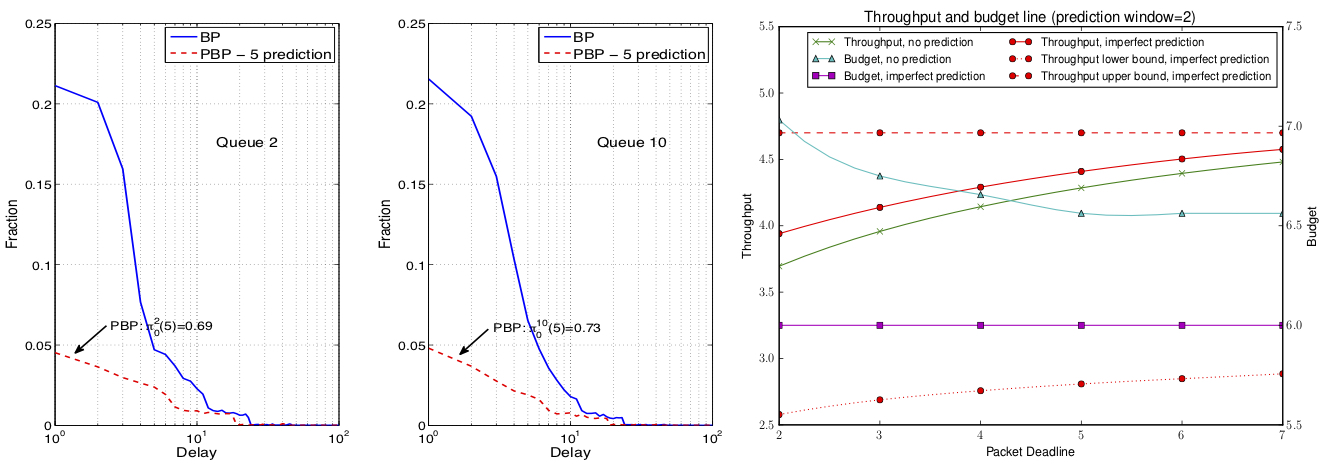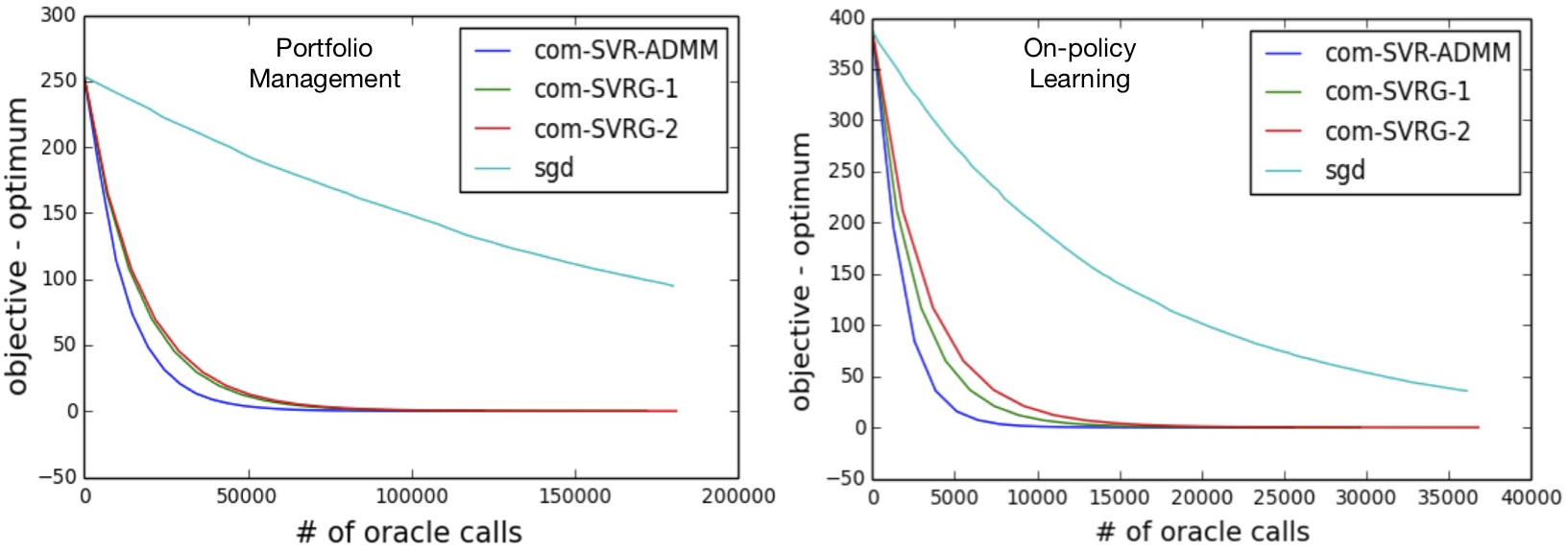Learning-aided Stochastic Network Optimization
Existing network optimization results have mostly been focusing on designing algorithms either based on full a-priori statistical knowledge of the system, or based on stochastic approximation for systems with zero knowledge beforehand. These two scenarios, though being very general, do not explicitly capture the role of information learning in control and do not reap the potential benefits of it. This ignorance often leads to a mismatch between algorithms in the literature and practical control schemes, where system information (data) is often constantly collected and incorporated into operations.
In this research thrust, we are interested in (i) quantifying fundamental benefits and limits of learning in network optimization, and (ii) designing simple and practical algorithms for achieving the full benefits.
 |
Recent publications:
L.Huang, M. Chen, and Y. Liu, ‘‘Learning-aided Stochastic Network Optimization with Imperfect State Prediction,’’ Proceedings of the 18th ACM International Symposium on Mobile Ad Hoc Networking and Computing (MobiHoc), July 2017.
L. Huang, ‘‘The Value-of-Information in Matching with Queues,’’ Proceedings of the 16th ACM International Symposium on Mobile Ad Hoc Networking and Computing (MobiHoc), June 2015.
L. Huang, ‘‘Receding Learning-aided Control in Stochastic Networks,’’ IFIP Performance (Performance), Oct 2015.
L. Huang, X. Liu, and X. Hao, ‘‘The Power of Online Learning in Stochastic Network Optimization,’’ Proceedings of ACM Sigmetrics (Sigmetrics full paper), June 2014.
Predictive Control in Information Systems
The rapid development of machine learning and user behavior study have made it possible to learn and predict user behavior, e.g., mobility patterns, user preferences and software resource demand. Various predictive control schemes have also been implemented in practice to significantly improve user experience. Despite such success, there has been limited theoretical understanding about how prediction fundamentally impacts system performance. Moreover, it is not clear how prediction can be efficiently incorporated into control algorithm design.
In this thrust, we are interested in establishing a general framework for studying the impact of prediction and predictive algorithm design, with the objective of further improving the performance of causal algorithms.
 |
Recent publications:
K. Chen and L. Huang, “Timely-Throughput Optimal Scheduling with Prediction,” IEEE International Conference on Computer Communications (INFOCOM), April 2018.
L.Huang, M. Chen, and Y. Liu, ‘‘Learning-aided Stochastic Network Optimization with Imperfect State Prediction,’’ Proceedings of the 18th ACM International Symposium on Mobile Ad Hoc Networking and Computing (MobiHoc), July 2017.
S. Zhang, L. Huang, M. Chen, and X. Liu, ‘‘Proactive Serving Decreases User Delay Exponentially: The Light-tailed Service Time Case,’’ IEEE/ACM Transactions on Networking (TON), vol. 25, issue 2, 708-723, April 2017.
L. Huang, “System Intelligence: Model, Bounds and Algorithms,” Proceedings of the 17th ACM International Symposium on Mobile Ad Hoc Networking and Computing (MobiHoc), July 2016.
L. Huang, S. Zhang, M. Chen, and X. Liu ‘‘When Backpressure meets Predictive Scheduling,’’ Proceedings of 15th ACM International Symposium on Mobile Ad Hoc Networking and Computing (MobiHoc), August 2014. (Best Paper Candidate)
Sharing Economy: Welfare and Revenue
Sharing economy has emerged as an enabling method for efficiently utilizing social resources that will otherwise have low-utilization. However, the growth of the sharing economy is driven mainly by sharing platforms, whose objectives might not be exactly aligned with social welfare. Thus, many interesting and important questions remain unclear. For instance, how much welfare loss may occur due to the mis-alignment of platform objective, how do prices and subsidies impact system performance, and how do we design optimal loyalty programs.
In this research direction, we are interested in fundamental questions regarding social welfare, platform management, and incentive mechanisms.
 |
Recent publications:
Z. Fang, L. Huang, and A. Wierman, “Loyalty Programs in the Sharing Economy: Optimality and Competition,” Proceedings of the 19th ACM International Symposium on Mobile Ad Hoc Networking and Computing (MobiHoc), June 2018.
Z. Fang, L.Huang, and A. Wierman, ‘‘Prices and Subsidies in the Sharing Economy,’’ Proceedings of World Wide Web (WWW) (full paper), April 2017. [ArXiv Technical Report, arXiv:1604.01627]
Stochastic Optimization and Machine Learning
Efficient algorithms are key to machine learning and data science. It is critical to design algorithms that have probable performance guarantees and fast convergence. Moreover, in many practical settings, it is also important to design algorithms that allow distributed implementation and are robust to communication errors or delay.
In this thrust, we are interested in designing efficient distributed algorithms for both convex and non-convex optimization problems.
 |
Recent publications:
Y. Yu and L.Huang, ‘‘Fast Stochastic Variance Reduced ADMM for Stochastic Composition Optimization,’’ Proceedings of the 26th International Joint Conference on Artificial Intelligence (IJCAI) (full paper), August 2017.
Age-of-Information: Optimizing the Freshness of Information
Realtime status information is critical for cyber-physical systems, e.g., self-driving cars. In such systems, what matters most is not how fast the update information gets delivered, but rather, how accurately the received information describes the physical phenomenon being observed. Age-of-Information has thus emerged as a novel metric to quantify the ‘‘freshness’’ of information.
In this thrust, we are interested in quantifying and understanding the age-of-information in various systems, and designing algorithms to optimize age-of-information dependent performance.
 |
Recent publications:
K. Chen and L. Huang, ‘‘Age-of-Information in the Presence of Error,’’ Proceedings of IEEE International Symposium on Information Theory (ISIT), July 2016.
L. Huang and E. Modiano, “Optimizing Age-of-Information in a Multi-class Queueing System,” Proceedings of IEEE International Symposium on Information Theory (ISIT), June 2015.
Energy Management and Smart Grid
Operating our computing infrastructure in an energy-efficient way is critical for making our planet a greener and better place. With the increasing penetration of renewal energy and storage technologies, which are dynamic and complicated in nature, optimizing energy management remains a challenging tasks.
In this research direction, we develop optimal energy management schemes for computing infrastructures and the power grid. Our research thrusts include (i) optimal energy management for computing infrastructures and (ii) energy storage and demand response in the smart grid.
 |
Recent publications:
M. Hajiesmaili, C. Chau, M. Chen, and L. Huang, ‘‘Online Microgrid Energy Generation Scheduling Revisited: The Benefits of Randomization and Interval Prediction,’’ Proceedings of ACM e-Energy (e-Energy), June 2016. (Best Paper Candidate)
L. Huang, “Optimal Sleep-Wake Scheduling for Energy Harvesting Smart Mobile Devices,” IEEE Transactions on Mobile Computing (TMC), vol. 16, issue 5, pp 1394-1407, May 2017.
N. Edalat, J. Walrand, M. Mehul, and L. Huang, ‘‘A Methodology for Designing the Control of Energy Harvesting Sensor Nodes,’’ IEEE Journal of Selected Areas in Communications - Special Issue on Wireless Communications Powered by Energy Harvesting and Wireless Energy Transfer (JSAC), Vol. 33, issue:3, pp. 598-607, March 2015.